India, UAE strengthen friendship; IIT Delhi to open first campus in Abu Dhabi
The IIT Delhi-Abu Dhabi campus is anticipated to open in 2024, with a variety of Bachelor’s, Master’s, and PhD programs, as well as research centres focused on sustainable energy and climate studies, as well as computer and data sciences.
By Newsmeter Network
Representational Image.
Hyderabad: The Ministry of Education, the Abu Dhabi Department of Education and Knowledge (ADEK), and the Indian Institute of Technology Delhi (IIT Delhi) have signed a Memorandum of Understanding (MoU) to build IIT Delhi’s first campus in Abu Dhabi.
The MoU, which supplements the ongoing UAE-India Comprehensive Economic Partnership Agreement (CEPA), reflects the countries’ shared vision of prioritising educational excellence, innovation, knowledge exchange, and human capital investments as the foundations for future prosperity and enablers of long-term economic growth and sustainable development.
The signing was witnessed by Sheikh Mohamed Bin Zayed Al Nahyan, president of the United Arab Emirates and Prime Minister Narendra Modi. Mubarak Hamad Al Mheiri, ADEK under secretary, Sunjay Sudhir, Indian ambassador to the UAE, and professor Rangan Banerjee, Director, Indian Institute of Technology Delhi inked the agreement.
Yet another #IITGoesGlobal!
— Dharmendra Pradhan (@dpradhanbjp) July 15, 2023
MoU for establishment of @iitdelhi campus in Abu Dhabi in the presence of Hon. PM @narendramodi ji unfolds a new chapter in internationalisation of India’s education.
An exemplar of #NewIndia’s innovation and expertise, the IIT Delhi campus in… pic.twitter.com/DYRy7Vbbwi
Union Education and Skill Development & Entrepreneurship minister Dharmendra Pradhan expressed his joy on the signing of the MoU on social media, saying that the signing of the MoU for the establishment of an IIT Delhi campus in Abu Dhabi in the presence of Narendra Modi opens a new chapter in the internationalisation of Indian education. The IIT Delhi campus in the UAE will be a symbol of India-UAE friendship, exemplifying New India’s creativity and competence.
He went on to say that the IIT Delhi campus in Abu Dhabi will establish a new standard for harnessing the power of knowledge for mutual development and global good.
Sara Musallam, minister of state for Early Education, chairman of the Federal Agency of Early Education, and chairman of ADEK, stated that the MoU is an important step in Abu Dhabi’s commitment to accelerate the development of a world-class education system that serves national development goals and priorities.
“The signing of this MoU is a significant step forward in our efforts to create a globally competitive education environment. This MoU underlines our commitment to offering world-class educational experiences, consistent with our national goal. We anticipate that the IIT Delhi-Abu Dhabi partnership will support our transition towards fostering an environment that nurtures innovation and accelerates high-level research,” she added.
Through collaboration with key players such as Mohamed bin Zayed University of Artificial Intelligence, Khalifa University, New York University Abu Dhabi, Technology Innovation Institute, and Hub71, IIT Delhi-Abu Dhabi will complement the academic, research, and innovation ecosystem in Abu Dhabi by offering complementary programs, conducting cutting-edge research, and advancing the local startup ecosystem.
The IIT Delhi-Abu Dhabi campus is anticipated to open in 2024, with a variety of Bachelor’s, Master’s, and PhD programs, as well as research centres focused on sustainable energy and climate studies, as well as computer and data sciences. The IIT Delhi-Abu Dhabi campus is anticipated to provide a wide range of programs in areas like energy and sustainability, artificial intelligence, computer science and engineering, mathematics and computing, and other engineering, scientific, and humanities subjects.
Graduates from IIT Delhi-Abu Dhabi will join an acclaimed alumni network of graduates from 23 campuses across India. With remarkable credentials, IIT Delhi was recently listed among the world’s top 50 engineering and technology colleges. In the 2022 QS World University Rankings, it was also ranked in the top 30 for global employability. IIT Delhi has made significant contributions to India’s R&D ecosystem in areas ranging from defence, healthcare, and rural development to transportation, information technology, and software.